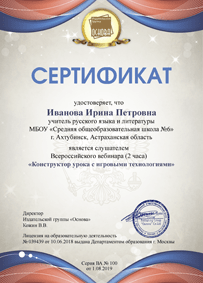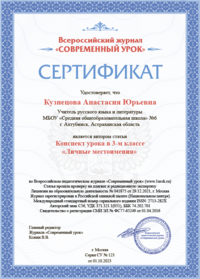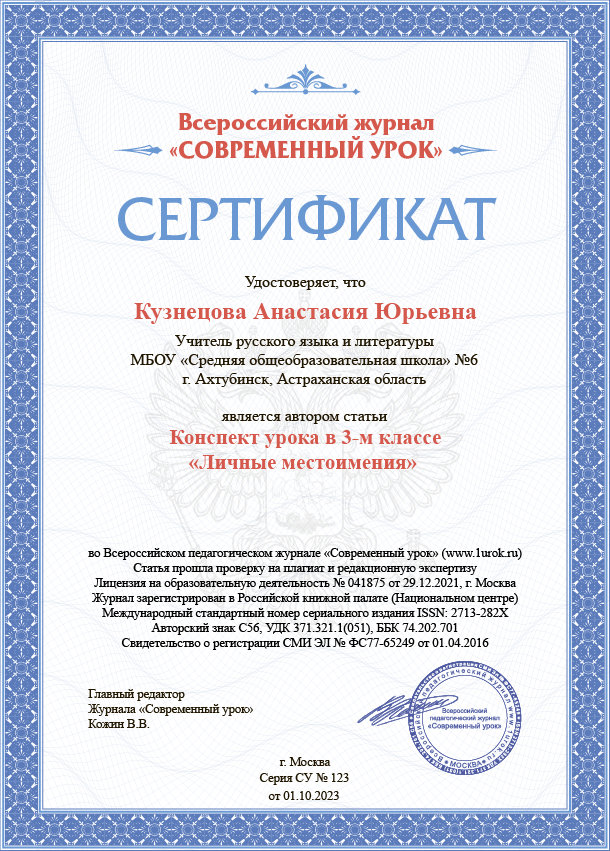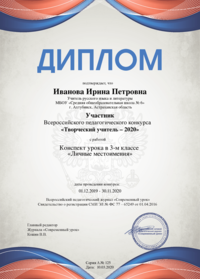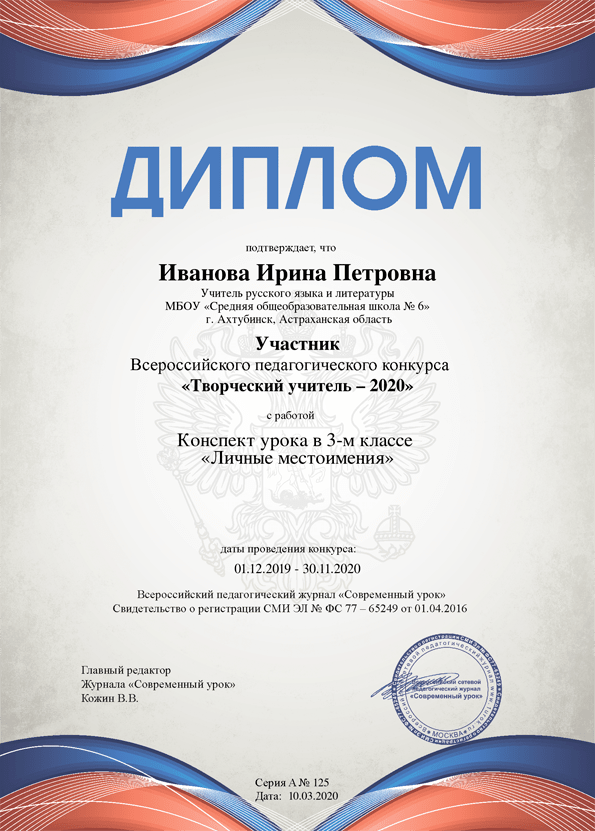Лексико-грамматический анализ текстов для домашнего чтения (на основе учебник Spotlight)
Автор: Быстрова Алла Вячеславовна
Организация: МБОУ Гимназия №1
Населенный пункт: Московская область, г. Серпухов
В свете современных требований к преподаванию английского языка в качестве центральной единицы обучения рассматривается текст, в связи с чем целесообразно как можно шире использовать работу с текстом, отрабатывать навыки рационального чтения, обучать анализу текста. Стратегии смыслового чтения, сформулированные ФГОС, включают в себя поиск информации и понимание прочитанного, преобразование, интерпретацию и оценку информации. Всё это можно назвать составными частями многоаспектного анализа текста.
Чтение иностранного текста представляет собой сложный процесс и означает не только владение техникой и приемами грамматического чтения, но и способность понимать мысль, выраженную на иностранном языке. Чтение специальных художественных, научно-технических текстов на английском языке показывает, что для английских текстов характерен сложный синтаксис, поэтому для работы с ними необходима не только специальная подготовка в плане решения терминологических вопросов, но и умение грамматически анализировать сложные предложения. Данные тексты отличаются наличием большого числа сложных предложений и конструкций, в них встречаются инфинитивные, причастные и герундиальные обороты, различные придаточные предложения; все "это вызывает затруднения в понимании их содержания
Немаловажным моментом является проведение анализа лексико-грамматических явлений на изучаемом языке. Это способствует расширению словарного запаса, стимулирует учащихся мыслить и говорить на английском языке, делает более научным содержательную составляющую обучения. Как следствие, открывает новые возможности в проектной деятельности учащихся.
Основным приемом полного раскрытия и понимания смысла любого предложения является лексико-грамматический анализ текста, который осуществляется в процессе грамматического чтения. Грамматическое чтение предложения — это членение предложения на отдельные смысловые группы (смысловая группа — это группа слов, входящая в одну синтаксическую группу, составляющую одно из звеньев целого предложения, т. е. группу подлежащего, сказуемого, обстоятельства и т.д.). При этом важно раскрыть связь как между отдельными смысловыми группами, так и между словами в пределах каждой смысловой группы.
Исходя из требований к результатам обучения в 9-11 классах лексико-грамматический анализ на уроке английского языка:
- развивает мотивацию и стремление к самосовершенствованию знаний лексики и грамматики изучаемого языка (личностный результат);
- способствует развитию исследовательских учебных действий, включая навыки работы с информацией (метапредметный результат);
- способствует овладению иностранным языком как средством общения, распознавания и употребление в речи основных значений изученных лексических единиц; знание основных способов словообразования (аффиксации, словосложения, конверсии);понимание и использование явлений многозначности, синонимии, антонимии и лексической сочетаемости; распознавание и употребление в речи основных морфологических форм и синтаксических конструкций изучаемого иностранного языка; знание признаков изученных грамматических явлений (видо-временных форм глаголов, модальных глаголов и их эквивалентов, артиклей, существительных, степеней сравнения прилагательных и наречий, местоимений, числительных, предлогов)( предметный результат).
На своих уроках я применяю методику лексико-грамматического разбора при работе с текстами по домашнему чтению. Задания учебника несколько скудны, поэтому приходится добавлять и расширять их. Как высший этап работы над текстами я предлагаю учащимся разработать самостоятельный лексико-грамматический разбор текста. Это, естественно, является высокой степенью работы учащихся в данном виде деятельности.
Здесь я привожу творческую разработку анализа учащихся 10 класса на основе текста «The Railway Children»(«Spotlight» 10.стр.34)
The Railway Children.
Chapter I: The Beginning of Things
They were not railway children to begin with. I don’t suppose they had ever thought about railways except as a means of getting to the pantomime, Zoological Gardens and Madame Tussauds. They were just ordinary suburban children, and they lived with their father and mother in an ordinary red-brick-fronted villa, with coloured glass in the front door, a tiled passage that was called a hall, a bathroom with hot and cold water, electric bells, French windows, a good deal of white paint, and ‘every modern convenience’, as the estate agents say. There were three of them. Roberta was the eldest. Of course, mothers never have favourites, but if their mother had had a favourite, it might have been Roberta. Next came Peter, who wished to be an engineer when he grew up; and the youngest was Phyllis, who meant extremely well.
Mother did not spend all her time paying dull calls to dull ladies, and sitting dully at home waiting for dull ladies to pay calls to her. She was almost always there, ready to play with the children, and read to them, and help them to do their home lessons. Besides this, she used to write stories for them while they were at school, and read them aloud after tea, and she always made up funny pieces of poetry for their birthdays and for other great occasions, such as the refurnishing of the doll’s house, or the time when they were getting over the mumps.
These three lucky children always had everything they needed: pretty clothes, a lovely nursery with heaps of toys and a Mother Goose wallpaper. They had a kind and merry nursemaid, and a dog who was called James, and who was their very own. They also had a father who was just perfect – never cross, never unjust, and always ready for a game – at least, if at any time he was not ready, he always had an excellent reason for it, and explained the reason to the children so interestingly and funnily that they felt sure he had to do it.
You will think that they ought to have been very happy. And so they were, but they did not know how happy till the pretty life in the Red Villa was over and done with, and they had to live a very different life indeed.
The dreadful change came quite suddenly.
Peter had a birthday – his tenth. Among his presents was a model engine more perfect than you could ever have dreamed of. The other presents were full of charm, but the engine was fuller of charm than any of the others were.
Its charm lasted in its full perfection for exactly three days. Then, owing either to Peter’s inexperience or Phyllis’s good intentions, or to some other cause, the engine suddenly went off with a bang. James was so frightened that he went out and did not come back all day. All the Noah’s Ark people who were in the tender were broken to bits, but nothing else was hurt except the poor little engine and the feelings of Peter. The others said he cried over it – but of course boys of ten do not cry, however terrible the tragedies may be which darken their lot. He said that his eyes were red because he had a cold. This turned out to be true, though Peter did not know it was when he said it, the next day he had to go to bed and stay there.
1. Find the translation of these words in the text and form the initial form from them.
1) Ужасный –
2) Ремонт. Замена обстановки –
3) Вслух –
4) Разный –
5) Неопытность –
6) Чрезвычайно –
7) Интересно –
8) Испуганный –
2. Match the selected words with their meanings. Use them in sentences of your own.
1) parotitis
2) usual
3) property
4) provincial
5) intersect
6) explosion
7) allure
3. Complete the sentences 1-5. Use the highlighted verbs from the text.
1) She was trying to ________ the song, when her brother came.
2) This _________ to be difficult.
3) He _______ in a small town not far from London.
4) Ann _________ over the flu for a few weeks last year.
5) Nick ________ to the kitchen.
4. Complete the collocations with the words from the text. Use each collocation in a sentence of your own.
1 _______ bells, 2 ______ calls, 3 doll`s ______, 4 a lovely _______,
5 ______ nursemaid, 6 dreadful _______, 7 ______ intentions, 8 a model ______
9 ______ of toys.
5. Read again and decide if the statements are true or false. Correct the false statements.
1) Children lived with their parents.
2) Roberta was the youngest child in the family.
3) Phyllis was her mother`s favourite.
4) Peter wished to be an engineer when he got older.
5) Their mother took care of them when they were getting over the mumps.
6) Children had a dog who was called James.
7) Their father was strict to them.
8) Peter said that his eyes were red because he was crying.
6. Сhoose a suitable phrasal verb GO for each sentences and put it in the correct form.
Off- with- back- away- on- up- through- after-
1) He tried to escape but the police ______ him everywhere.
2) The magnificent building _____ on the site of the former slums.
3) My grandfather _____ the war without a scratch.
4) When I entered the room he greeted me and ______ working.
5) You look great today! Your red dress ______ your shoes and your handbag.
6) This milk tastes sour. It _______.
7) Did you like our hospitable country? _____ you _______ here next year?
8) If you start moving fast your backache ___________.
7. Complete adjectives 1-10 below with prefixes in the box.
Anti- non- over- pre- post- pro- self- under- mis- dis-
1) ____ perfect (= perfect too much)
2) _____ fed (= not given enough food)
3) _____ poor (= without poverty)
4) _____ game (= after the game)
5) _____ school (= nursery)
6) _____ critical (= critical of yourself)
7) _____ shaped (= wrongly or badly shaped)
8) _____ govermemt (= favourite the government)
9) _____ poetry (= against poetry)
10) ____ coloured (= without colour)
8. Insert a suitable preposition.
At- in- on-
a)
1) John built the cottage __ the lake.
2) He is going to come __ a train.
3) Alice was __ the train when I’ve come to meet her.
4) There were a lot of directors __ a festival.
5) We arrived at the station ___ time.
6) Their house is __ 36 Park Avenue.
7) Cafe is closed. The stuff is __ holiday.
b)
1) Do you sometimes watch TV ____ the mornings?
2) Are you usually __ home ____ 7 o’clock ____ the evenings?
3) Do you sometimes work ___night?
4) What do you usually do ____ weekends?
5) Do you usually go shopping ____ Saturdays?
6) Do you go skiing ____ the winter?
7) Do you have a holiday ____ December?
8) Is there a holiday in your country ____ 6, January?
9. Expand the brackets by using the verbs in the correct tense.
1) Around me people (to talk) Russian, Italian and English.
2) Sam (lose) his keys. So he can’t open the door.
3) When I woke up in the morning, the rain already (stop).
4) I hope I (finish) my test by midnight.
5) The film turned out to be much longer than we (expect).
6) We (to sunbathe) on the beach for several hours by the time she reads our letter.
7) Look at the sky: the clouds (to move) slowly, the sun (to appear) from behind the clouds, it (to get) warmer.
8) She (to argue) that only Belinda knew how to treat men.
9) I hope you (to join) us when we (to gather) in our country house the next time.
10) If we (to put) in surveillance cameras, they (to stop) people stealing things.
Keys
1.
1) Dreadful. Dread
2) Refurnishing. Furnish
3) Aloud. Loud
4) Different. Differ
5) Inexperience. Experience
6) Extremely. Extreme
7) Interestingly. Interest
8) Frightened. Fright
2.
1) The mumps
2) Ordinary
3) Estate
4) Suburban
5) Cross
6) Bang
7) Charm
3.
1) Make up
2) Turned out
3) Grew up
4) Getting over
5) Went off
4.
1 electric bells, 2 dull calls, 3 doll`s house, 4 a lovely nursery,
5 merry nursemaid, 6 dreadful change, 7 good intentions, 8 a model engine
9 heaps of toys.
5.
1) T
2) F
3) F
4) T
5) T
6) T
7) F
8) F
6.
1) Went after
2) Went up
3) Went through
4) Went on
5) Goes with
6) Has gone off
7) Will you be doing back
8) Will go away
7.
1) Over-
2) Under-
3) Non-
4) Post-
5) Pre-
6) Self-
7) Mis-
8) Pro-
9) Anti-
10) Dis-
8.
a)
1) On
2) On
3) In
4) At
5) In
6) At
7) On
b)
1) In
2) At, at, in
3) At
4) At/on
5) On
6) In
7) In
8) On
9.
1) Were talking
2) Has lost
3) Had already stopped
4) Will have finished
5) Had expected
6) Shall/will have been sunbathing
7) Are moving, is appearing, is getting
8) Was arguing
9) Will join, gather
10) Put, will stop

